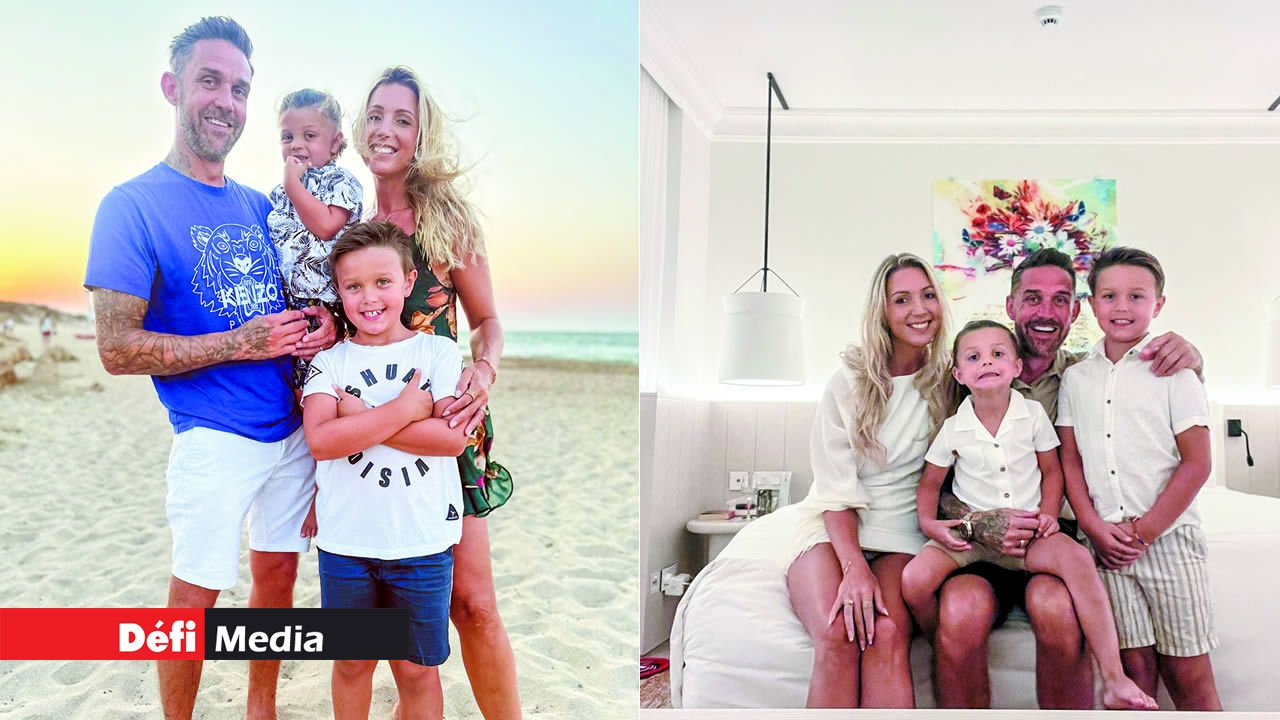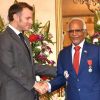
On a quiet November morning in Grand Baie, Adam and Tara Short found what most families only dream of. As their children, Spencer and Xander, played on the sand, they felt it, a sense of belonging they’d never known, not even after countless trips to Bali. “This is where we want to live.” Today, the British expat family, known online as The 4 Shorts, share their Mauritian journey with tens of thousands on TikTok. Their feed overflows with hotel day passes, roadside biryani, rum cocktails, and sunset beaches. Behind the laughter and filters lies a deeper story — of courage, identity, family, and the art of slowing down.
The Short family comes from Sheffield, UK. Adam, 44, runs a car and fishing business, while Tara, 38, supplies the hospitality industry. Their sons, Spencer, nine, and Xander - what might seem like an ordinary British family on paper. Yet even ordinary families carry extraordinary dreams. “We were a bit lost and unsure where to settle down,” they recall, explaining how several trips to Bali never quite sparked the feeling they found during a visit to Mauritius last November.
Back in the UK, life had started to feel rushed: long work hours stretching into evenings, grey skies pushing children indoors, and screens gradually replacing playgrounds. “It was a big decision,” Tara admits. “Xander was about to start school. Spencer was settled and playing for an amazing local football team.” So when they finally revealed their relocation plans to friends and family — to a tiny island in the Indian Ocean few could pinpoint on a map — reactions ranged differently. But the Shorts were not driven by impulse; they were guided by a rare clarity. They weren’t running from something. They were moving toward something better. “A simpler life,” they say without hesitation, “a safer, more outdoor environment for our children to grow.”
Home Isn’t a Place — It’s a Feeling
Ask them what “home” means now, and their answer arrives without hesitation: “Home isn’t a place, it’s a feeling and it’s the people around you.” It’s a definition shaped not by bricks or postcodes, but by connection. For the Shorts, that realisation didn’t appear in a dramatic flash; there were no fireworks, no cinematic backdrop. Instead, it arrived quietly on an ordinary afternoon by the sea — rotis warm in their hands, tamarind juice dripping down their fingers, children splashing through the shallow water as filao shadows stretched across the sand. In that simple moment, something settled in their hearts. They looked around and felt it — belonging wasn’t something to search for anymore; they were already living inside it.
Mauritius has a way of quietly filling spaces you didn’t know were empty. Little by little, the island’s rhythms seep into daily routine: neighbours waving from across the road, strangers greeting with wide smiles, evenings that stretch into soft pastel sunsets. And while they do miss friends and family from their old life, technology keeps them close, and the warmth of the people around them has made those distances easier to carry. Their closest circle from the UK has already visited, now woven into this new chapter, and the friendships they’ve formed on the island have grown faster and deeper than they expected.
“If paradise teaches you anything,” Adam reflects, “it’s how to be grateful for what stays.” Gratitude, they’ve learned, isn’t loud or showy. It grows quietly in the everyday — in the calm certainty that they are exactly where they are meant to be, surrounded by the kind of community and contentment they once thought only existed in dreams.
Unfiltered Island Life
On TikTok, the Shorts’ world looks gloriously sun-lit. It is easy to get swept up in the postcard version of island life. But behind those clips, the family never pretends everything is perfect. “The wild dog situation in Mauritius is a problem,” they admit, speaking with empathy rather than criticism. “The government is addressing it, and locals often feed them. But it’s something tourists rarely see.” It’s one of many small realities of living on an island that doesn’t always make it to social feeds.
Then there is the cost of living — the unglamorous truth hidden behind coconut trees and calm lagoons. Almost everything imported carries a premium, and while the Shorts occasionally hint at it with playful captions like “OMG, so expensive!” under a fresh juice or a bag of groceries, the deeper reality is a budget that would stretch further back home. It’s the side of paradise you only understand once you live in it.
And yet, for them, the beauty outweighs the inconveniences a hundredfold. In the UK, after-school hours might have meant children indoors, screens glowing against grey windows, rain thrashing in long winter evenings. Here, school bags are dropped by the door, and childhood spills outdoors — swimming until fingertips wrinkle, paddle boarding across glassy water, climbing trees, building sandcastles, and laughing in the sea until the horizon blushes pink. These are the hours that shape memory.
“Mauritians value family time so much more,” the Shorts explain, a lesson that has quietly seeped into their own routine. In a world that often glorifies rushing, hustle, distraction, Mauritius has taught them to be present — to look up, slow down, and make the most of the fleeting summers of childhood. A reminder that paradise is not only where you live, but how you live once you get there.
Living the Moments the Camera Misses
As content creators, the Shorts often face a familiar modern dilemma: do you film the moment or simply live it? It’s a question that quietly shadows every sunset, every beach day, every spontaneous adventure. “Yes,” Tara admits, “sometimes you have to choose. So we take days when we don’t film anything.” Ironically, it’s those unplugged days that keep their content grounded and genuine. Their humour remains unfiltered, their reactions to Mauritian biryani are honestly wide-eyed and enthusiastic, and their joy jumping off boats or chasing waves feels undeniably real. They don’t manufacture paradise for the camera; they document it as it unfolds naturally around them. “We try not to take ourselves too seriously,” they say, and it shows — in the bloopers, the playful teasing, the messy hair and salty skin.
That authenticity has created a digital community that feels surprisingly intimate. Followers send restaurant recommendations, tip them off about hidden coves, share stories of Mauritian childhood traditions, and invite them to local events. The exchange is no longer one-sided; it’s a dialogue, layered with curiosity and warmth. Locals now recognise Adam in supermarkets, petrol stations, and on the beach, often stopping to share how meaningful it feels to see a foreign family celebrating the island’s treasures rather than criticising or comparing. The Shorts receive it all with equal humility and gratitude. “Everyone is really positive about the fact we are promoting Mauritius,” they say, still a little amazed by the response.
Their content reminds viewers that paradise isn’t found in glamorous edits, but in genuine smiles, shared sunsets, and the courage to live fully in the spaces between the camera clicks.
The Children of Two Worlds
How has island life shaped their children? The Shorts pause for a moment before answering. “They might not fully understand now. But as they grow, they’ll learn that if they set their minds to something, they can achieve it.” Mauritius, after all, offers a daily classroom without walls. On the beach, the boys learn courage not through lectures, but by paddle boarding a little further with each attempt. They learn resilience every time a wave knocks down their sandcastle and they rebuild it with determination. Creativity is born from wet sand and seashells; empathy is discovered when sharing snacks with new friends; confidence blossoms in sunshine and salt water. Friendships here come without borders or labels — formed on school playgrounds, football pitches, and the quiet meeting point where ocean edges meet childhood laughter.
And while some parents might worry about their children growing up between two cultures, the Shorts do not carry that fear. “We don’t worry,” Tara says. “Mauritius is full of different nationalities. Ninety-nine percent of Mauritians have been incredibly welcoming.” Belonging here is not dictated by bloodlines or accents; it is shaped by warmth, curiosity, and open arms. When children grow up watching diverse communities share beaches, food, festivals, and language, they internalise something powerful — that the world is wide, and home can be layered.
Their dreams for their boys are simple and profound. “They’re living on an island with endless possibilities — with better education and life experiences than ever before. Their future is outdoor and healthier than it ever could be in the UK.” There is no price tag for learning to swim before learning to scroll, for climbing trees instead of walls, for chasing sunsets instead of deadlines. Perhaps this, the Shorts reflect, is what modern childhood should look like — salt tangled in hair, sand between toes, horizons that stretch wide and unafraid, and the steady knowledge that the world can be gentle if you are brave enough to seek it.
Slowing Down to Hear Your Own Heartbeat
Mauritius is famous for its slow rhythm — a gentle island patience that unfurls like hibiscus petals in warm air.
Has it changed them?
“Yes. Our life here still feels fast-paced, but it’s more rewarding. Our health is improving because we’re far more active.”
Their mindset shifted.
In the UK, the equation felt different. More money often meant more pressure. Success was measured in longer hours, tighter schedules, and crowded calendars. Time with family became something precious you had to fight to schedule.
On this island, the formula changes. More time means more happiness. Success is measured in joy, not exhaustion. Childhood is lived outdoors, not on screens — in saltwater, sand, and grass fields rather than blue light. The boys come home from school and run straight back out into the world, chasing birds across the beach or paddling into the lagoon.
“We’ve learnt that things take time here,” they say. “To be patient. To chill.” It’s a cultural lesson that arrived softly, but settled deeply. Island time is not laziness; it’s presence — knowing when to hurry and when to simply exist. Their TikTok captions often hint at this new philosophy: short, sunshine-soaked reminders to breathe, smile, and savour. They’re not just documenting Mauritius; they are learning how to hear their own heartbeats again — unhurried, steady, and alive.
“For us, it’s not about money or success anymore,” they say. “It’s about being content with our family and having more quality time.”
Digital community revealed something unexpected too. “Yes, it’s changed how we see ourselves,” Adam admits. “Actually, I realised I’m a sociable person — which I wasn’t in the UK. It’s not just landscapes that transform you. Sometimes, context reveals parts of you that longed for sunlight.
Have they had days when paradise felt like pressure? “Not yet — it’s still new. But when we do… we’ll probably just take a walk to the beach and remember how lucky we are.” That, perhaps, is the secret. In the presence of the ocean, problems shrink. Priorities sharpen. And gratitude hums like waves against rock.
Building Paradise - One Story at a Time
Beyond the followers, likes, and tropical aesthetics, what legacy do the Shorts hope to leave? “That others take the risk if they were perhaps not sure.”
When people watch their videos, they hope one feeling remains: “That life is for living.” The Shorts didn’t just relocate. They reimagined life.”

Notre service WhatsApp. Vous êtes témoins d`un événement d`actualité ou d`une scène insolite? Envoyez-nous vos photos ou vidéos sur le 5 259 82 00 !



















